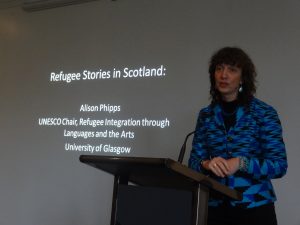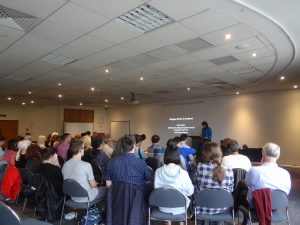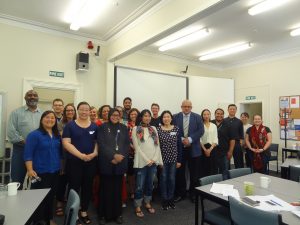Report on Prof Phipps’ Public Lecture on Refugee Stories in Scotland
On 6 December 2017, Professor Alison Phipps, UNESCO Chair of Refugee Integration through Languages and the Arts at the University of Glasgow, spoke to a capacity audience about Refugee Stories from Scotland. Beginning and ending her talk with the sea – ‘the sea has locked them up’ – Professor Phipps highlighted not a refugee ‘crisis’, but a crisis of reception and a crisis of hospitality. She spoke about the criminalisation of humanitarian endeavours that offer help to those seeking sanctuary, of containers in refugee camps being used to keep people immobile, and about the dehumanising xenophobic language of negativity and hostility that accuses refugees as stealing goods and livelihoods.
There is a need, then, for a positive discourse to circulate within the public sphere, rather than continue xenophobic tropes that have characterised the history of immigrants, including groups such as the Huguenots and the Jews. And rather than the constant re-traumatising that arises from a focus on journeys, Professor Phipps advocated utilising poetry, music and film to tell stories of meeting, greeting, and eating. People love to share their language and the audience viewed clips of various ethnicities providing welcome greetings to Scotland in their language, including from a Kiwi. With possibly the world’s first ever integration strategy, the Scottish government advocates use of the term ‘New Scots’ instead of ‘refugees’. Although ruled from Westminster and unable to legislate for immigration, Scotland does have devolved care for refugees. This can take many forms including statements such as ‘You have honoured us by making Scotland your home’.
We were honoured to have Professor Phipps so eloquently and passionately share with us her work with New Scots and the ways that Scotland is working to ensure harmonious refugee resettlement. Among such examples is the following musical collaboration, ‘A Time Will Come’, between Ghanaian artist Naa Densua Tordzro and Scottish singer and composer Karine Polwart: http://www.bbc.co.uk/programmes/articles/b0N1nKxcRkvWLQsdStTHw8/new-european-songbook-united-kingdom-karine-polwart-and-naa-densua-tordzro : ‘Will a time come when you might need help?’
Education, Migration and Translation Symposium
On Sunday 26 November 2017, we held a one-day symposium on education, migration and translation, organised by Professor Henry Johnson and Dr Vivienne Anderson. The keynote speaker was Professor Michael Singh from the Centre for Educational Research, Western Sydney University. A further 13 presentations followed, leading to rich and stimulating conversations.
One of our presenters, Sherrie Lee from the University of Waikato, featured the symposium on her blogsite, ‘The Diasporic Academic’. Presenting five papers at four events over three weeks, we were delighted that Sherrie awarded us her prize for ‘Best Intellectual Engagement’. Sherrie wrote of the event:
‘The one-day multi-disciplinary symposium was varied in its presentations ranging from the classroom, to community, to larger ideological issues operating in diasporic and multiethnic spaces. Despite the wide-ranging topics, I enjoyed and learnt from the high quality presentations, not least the keynote presentation by Professor Michael Singh who demonstrated strong theoretical and historical links among the three big themes of education, migration and translation.
‘This one day symposium was truly an unforgettable experience where we spent most of that Sunday in one seminar room, not only sampling a large array of research, but having rich conversations with one another.’
Dunedin also won Sherrie’s prize for Best conference city. As she noted, ‘The lovely weather sustained throughout the five days I was there was simply unbeatable.’




